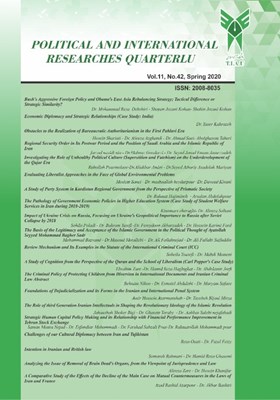The Basis of the Legitimacy and Acceptance of the Islamic Government in the Political Thought of Ayatollah Seyyed Mohammad Bagher Sadr
Subject Areas : Political and International Researches Quarterly
Mohammad Bazvand
1
,
Masoud Motallebi
2
,
Ali Fallahnejad
3
![]() ,
Ali Fallahi Saifuddin
4
,
Ali Fallahi Saifuddin
4
1 -
2 -
3 -
4 -
Keywords: Acceptance, Legitimacy, Islamic government, VelayateFaqih,
Abstract :
Mohammad Bazvand[1] Masoud Motallebi[2] Ali Fallahnejad[3] Ali Fallahi Saifuddin[4] Abstract: One of the fundamental issues of any government is the issue of legitimacy and acceptance, the strengthening of which plays an irreplaceable role in the establishment and stability or,conversely, the weakening of it in the instability and collapse of the government. In this article, which has been written with a descriptive-analytical approach, in response to what is the basis of legitimacy and acceptability in the theory of Islamic government, Ayatollah Seyyed Mohammad Baqir Sadr, argues that he considered legitimacy as a combination of divine-popular will. As in addition to accepting Velayat-e-Faqih such as the source of divine legitimacy of the Islamic government, it emphasizes the role of the people in determining their destiny and tries to create a link between legitimacy and acceptance in the Islamic government by granting the right to choose the nation in all aspects of government. [1]- PhD Student in Political Science, Khorramabad Branch, Islamic Azad University, Lorestan, Iran [2]- Assistant Professor of Political Science, Azadshahr Branch, Islamic Azad University, Golestan, Iran:Corresponding Author [3]- Assistant Professor of Political Science, Khorramabad Branch, Islamic Azad University, Lorestan, Iran [4]- Assistant Professor of Political Science, Khorramabad Branch, Islamic Azad University, Lorestan, Iran
_||_


